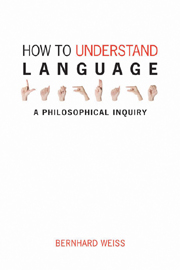Book contents
- Frontmatter
- Contents
- Preface
- 1 The puzzles of language
- 2 The starting-point for analysis
- 3 Analysing sentence-meaning
- 4 Analysing synonymy
- 5 Radical translation
- 6 The structure of a theory of meaning
- 7 Radical interpretation
- 8 Linguistic norms, communication and radical interpretation
- 9 Linguistic normativity
- 10 Radical or robust?
- 11 Language and community
- 12 Rules and privacy: the problem
- 13 Rules and privacy: the solution?
- 14 Truth-conditions versus use-conditions
- Notes
- Bibliography
- Index
12 - Rules and privacy: the problem
- Frontmatter
- Contents
- Preface
- 1 The puzzles of language
- 2 The starting-point for analysis
- 3 Analysing sentence-meaning
- 4 Analysing synonymy
- 5 Radical translation
- 6 The structure of a theory of meaning
- 7 Radical interpretation
- 8 Linguistic norms, communication and radical interpretation
- 9 Linguistic normativity
- 10 Radical or robust?
- 11 Language and community
- 12 Rules and privacy: the problem
- 13 Rules and privacy: the solution?
- 14 Truth-conditions versus use-conditions
- Notes
- Bibliography
- Index
Summary
The problem of rule-following
In sections 172–242 of his Philosophical Investigations Wittgenstein considers the nature of following a rule. We shall concentrate on Kripke's (1982), now classic, exposition of this argument.
Consider the following, natural enough, train of thought. There are many addition sums that I have never performed – let us, following Kripke, assume that 68 + 57 is among them. Now one normally supposes that, given what I have always meant by “+”, there is just one correct response to this addition sum, namely: 125. In other words, if asked what the sum of 68 and 57 is according to the way I have understood addition, I should respond with a numeral denoting 125. Or, to call on thoughts about compositionality, one supposes that we have succeeded in conferring a meaning on the signs “68”, “57” and “+” such that the complex sign formed from them – “68 + 57” – has a determinate meaning and thus refers to a determinate number, namely, that number that is the correct answer to our addition sum.
The first thing to note here is that, if this is indeed a very natural train of thought, then the meaning of a sign such as “+” – that is, what you understand when you understand that sign – sets up a standard of correctness against which your future use is measured.
Information
- Type
- Chapter
- Information
- How to Understand LanguageA Philosophical Inquiry, pp. 181 - 200Publisher: Acumen PublishingPrint publication year: 2009
